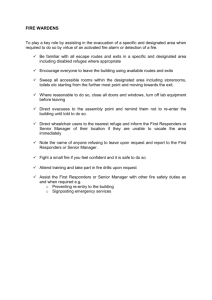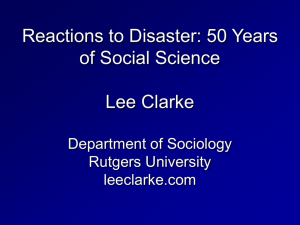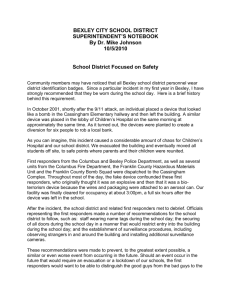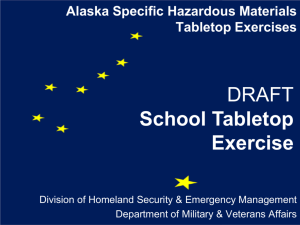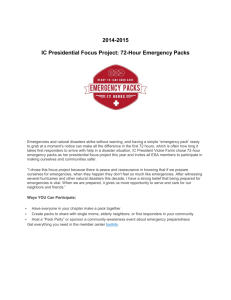First Responders, Mental Health Services, and the Law
advertisement
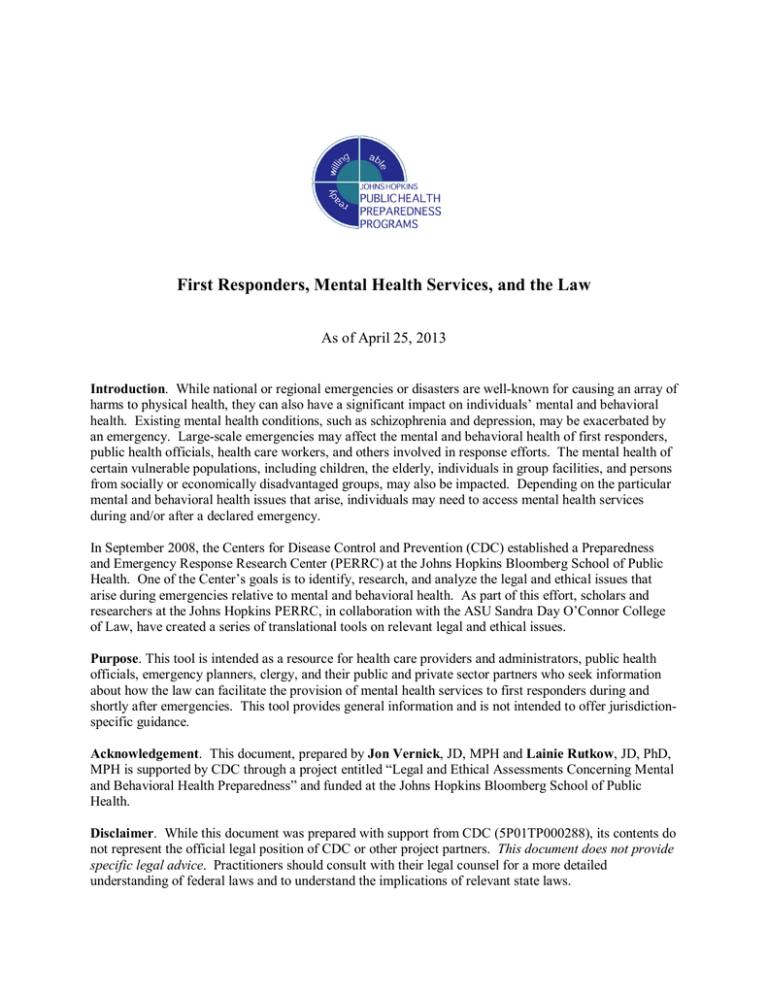
First Responders, Mental Health Services, and the Law As of April 25, 2013 Introduction. While national or regional emergencies or disasters are well-known for causing an array of harms to physical health, they can also have a significant impact on individuals’ mental and behavioral health. Existing mental health conditions, such as schizophrenia and depression, may be exacerbated by an emergency. Large-scale emergencies may affect the mental and behavioral health of first responders, public health officials, health care workers, and others involved in response efforts. The mental health of certain vulnerable populations, including children, the elderly, individuals in group facilities, and persons from socially or economically disadvantaged groups, may also be impacted. Depending on the particular mental and behavioral health issues that arise, individuals may need to access mental health services during and/or after a declared emergency. In September 2008, the Centers for Disease Control and Prevention (CDC) established a Preparedness and Emergency Response Research Center (PERRC) at the Johns Hopkins Bloomberg School of Public Health. One of the Center’s goals is to identify, research, and analyze the legal and ethical issues that arise during emergencies relative to mental and behavioral health. As part of this effort, scholars and researchers at the Johns Hopkins PERRC, in collaboration with the ASU Sandra Day O’Connor College of Law, have created a series of translational tools on relevant legal and ethical issues. Purpose. This tool is intended as a resource for health care providers and administrators, public health officials, emergency planners, clergy, and their public and private sector partners who seek information about how the law can facilitate the provision of mental health services to first responders during and shortly after emergencies. This tool provides general information and is not intended to offer jurisdictionspecific guidance. Acknowledgement. This document, prepared by Jon Vernick, JD, MPH and Lainie Rutkow, JD, PhD, MPH is supported by CDC through a project entitled “Legal and Ethical Assessments Concerning Mental and Behavioral Health Preparedness” and funded at the Johns Hopkins Bloomberg School of Public Health. Disclaimer. While this document was prepared with support from CDC (5P01TP000288), its contents do not represent the official legal position of CDC or other project partners. This document does not provide specific legal advice. Practitioners should consult with their legal counsel for a more detailed understanding of federal laws and to understand the implications of relevant state laws. First Responders, Mental Health Services, and the Law Background: First responders are the individuals who provide services in the immediate aftermath of an emergency. They represent a variety of disciplines, and may include law enforcement officials, medical personnel, mental health providers, firefighters, and search and rescue teams. While first responders face the possibility of physical harm from environmental and other exposures, their work may also negatively impact their mental health. Pre-existing mental health conditions may be exacerbated and new mental health conditions may arise due to extremely stressful working conditions that are physically and emotionally taxing. A growing body of literature suggests that, due to the nature of their work, first responders may be more likely to experience certain mental health issues—such as post-traumatic stress disorder—than the general population. It is, therefore, increasingly important to identify opportunities for the law to protect and promote the mental health of first responders before, during, and after their participation in emergency responses. Augmenting the Mental Health Workforce: In non-emergency situations, there are often not enough professionals who provide mental health services (e.g., psychologists; psychiatrists; social workers; counselors) to meet the population’s needs. This is felt more acutely during an emergency, when a concentrated group of people within one geographic area may have a surge in their need for mental health care. To help ensure that first responders’ mental health needs are met during and after a response, policy-makers, emergency planners, and others should consider whether the law allows them to augment the mental health workforce in their state. The following questions raise important legal issues to consider: • Has your state passed a law that allows out-of-state health professionals to temporarily practice in the state during and shortly after an emergency occurs? (Note: Such a law may be found in the public safety, emergency preparedness, or public health section of the state code). • Has your state joined and implemented the Uniform Emergency Volunteer Health Practitioners Act (UEVHPA), which allows licensed volunteer health care providers from out-of-state to temporarily practice in a state experiencing an emergency? • What liability protections are available for mental health professionals who participate in an emergency response in your state? (Note: these protections may appear in different laws, including UEVHPA, the Emergency Management Assistance Compact (EMAC), or state-specific laws that facilitate licensure portability). • During prior emergencies within your state, which laws have been employed to allow out-of-state mental health professionals to temporarily practice in the state? What, if any, impediments were faced? Access to Mental Health Services: Laws at the federal, state, and local levels have established several options for first responders to receive mental health care. Unfortunately, due to the stigma associated with mental health diagnoses and related care, first responders may be reluctant to inquire about the availability of mental health services. Therefore, it is important for employers and relevant professional organizations to understand the available opportunities, and to assist first responders in recognizing them. The following questions may help policy-makers, emergency planners, and others to identify these opportunities: • Does your organization or agency offer voluntary mental health screenings for first responders? If yes, how are the screenings publicized? • Are there any established programs (i.e., the World Trade Center Health Program) in your state that provide mental health services for first responders? • Does your state provide workers’ compensation coverage for both physical and mental health workrelated injuries? • Has your state enacted laws (e.g., UEVHPA; EMAC) that contain workers’ compensation protections for individuals who participate in a response? • Has your state legally extended workers’ compensation to include first responders who may either serve as volunteers during a response or provide services outside of their traditional scope of work?
